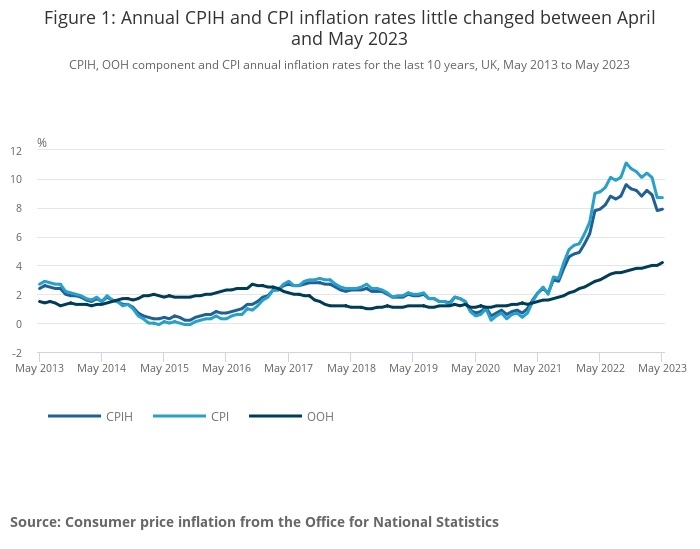Financial Planners and wealth managers have shared their disappointment at CPI inflation remaining stubbornly stuck at 8.7% in May.
CPI inflation had been expected to fall to 8.4% year-on-year but it remained unchanged at 8.7% in May, according to today’s figures from the ONS.
Higher prices for travel and recreational goods and services were a key contributor to inflation over the month.
Inflation fell from 10.1% in March to 8.7% in April, with many Financial Planners and economists forecasting further falls for May.
CPIH (CPI including housing costs) from slightly from 7.8% in April to 7.9% in May while RPI (an older measure of inflation) fell slightly from 11.4% to 11.3%.
The Bank of England CPI target remains 2%.
George Lagarias, chief economist at Mazars, said: “There’s no way to sugar-coat this, 8.7% is a bad number. Inflation has become entrenched and remains high versus other developed market economies.
"This number will compel policymakers, the Government and the Bank of England, to further clamp down on consumption, in order to break the wage-price spiral. We expect that growth will further decelerate, possibly even pushing the economy past the recession threshold, even as early as the Autumn.”
Some wealth managers shared concerns that continued inflation could push many UK households to breaking point.
Marcus Brookes, chief investment officer at Quilter Investors, said: “Today’s inflation figure will be a bitter pill to swallow for consumers, investors and the government. With CPI unchanged and core inflation rising, this confirms that the Bank of England has no choice but to raise interest rates tomorrow.
"Having jumped down from double digits last month, we are once again left to wait for inflation to return to its downwards trajectory to normal levels. The UK really does seem to be suffering from a more unique set of circumstances and this is leaving the Bank of England with little choice, despite consensus that this inflation is driven more by supply issues than demand ones.
“Ultimately, while the UK consumer has held up fairly well in the cost of living crisis to date, we are starting to see signs of buckling, with the looming mortgage shock coming further into view and interest rates now beginning to bite on households. Subsequent rate rises are going to stoke mortgage fears further, but the Bank of England will feel like it has no choice, especially with core inflation now rising again.
“Unlike our US counterparts, there is unfortunately more pain to come in the shape of higher interest rates, and signs are pointing towards tomorrow’s rise not being close to the last. Any thoughts of a pause, let alone rate cuts, seems incredibly premature, highlighting the economic muddle the UK faces.”
Core CPI inflation rose to 7.1% from 6.8% for the month of May.
Tom Hopkins, portfolio manager at BRI Wealth Management called on the Bank of England to change its plans.
He said: “Core inflation has risen to 7.1% from 6.8%, and this is the key concern. Core inflation is keeping UK inflation stubbornly high. We would have had downward contributions coming from fuels and food, unfortunately this would have been offset by rises in services inflation. At 8.7%, households will still be feeling the pain of the squeeze on budgets.
“The Bank of England meets tomorrow to decide interest rates, but given the strong rise in core inflation coupled with a surprisingly resilient economy, we believe a 50 basis point rise will be more in consideration for the Bank of England than the unanimous expectation of 25bp amongst economists.
“Inflation remains well above the 2% target rate and given Rishi Sunak’s target of halving inflation to 5% by the end of the 2023 that he pledged in January, maybe the Bank of England needs to do more.”
Alexandra Loydon, director partner engagement and consultancy at St James's Place, said investors need to ensure they continue to diversify.
She said: “Inflation is putting an increasing strain on families and businesses, but there is no doubt that the Bank of England will continue to keep the option of interest rate rises firmly on the table. Ahead of tomorrow’s decision, there is little scope for easing the pressure on borrowers and it is particularly stark for those on variable rate mortgages.
“As for investors, they will need to continue to diversify their portfolios to ensure they are as inflation-proofed as they can be and can reduce risk when markets are volatile.”

